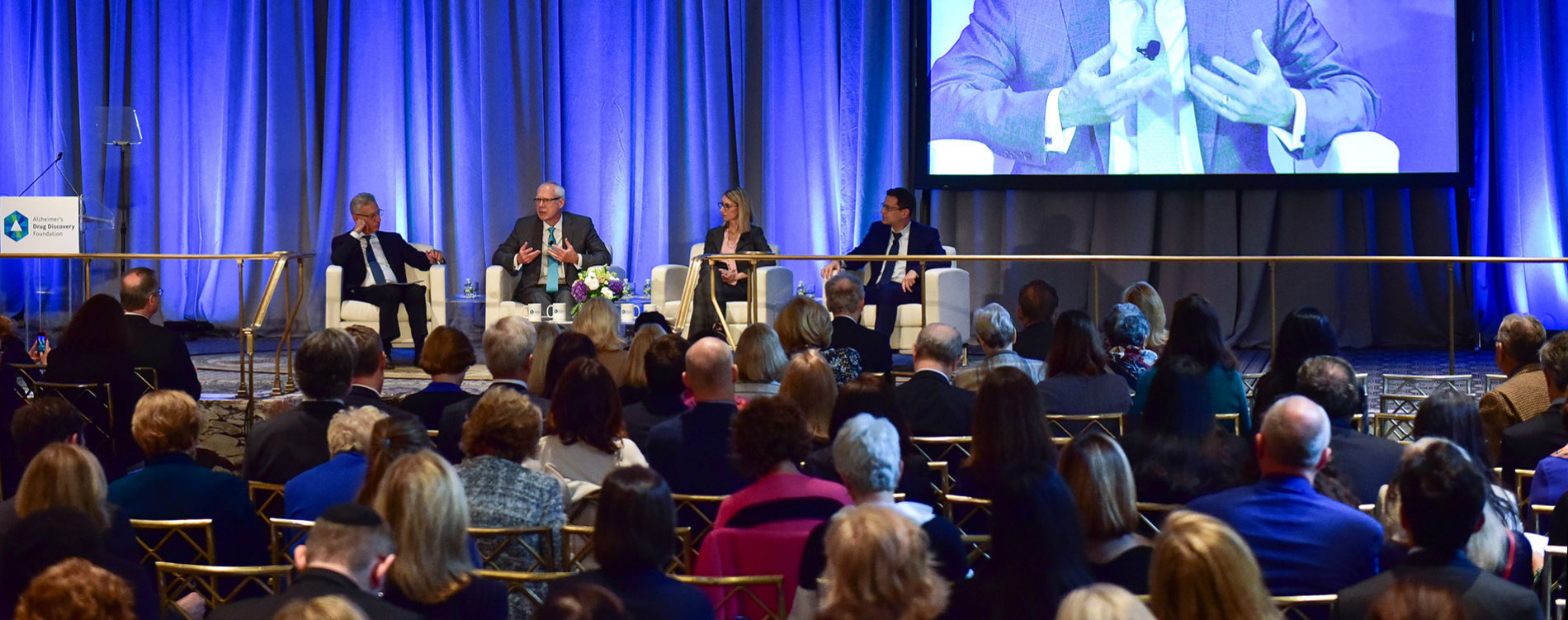At the Alzheimer's Drug Discovery Foundation's (ADDF) recently-held Ninth Annual Fall Symposium & Luncheon "Hope on the Horizon," I had the pleasure of moderating a panel discussion featuring three highly-respected Alzheimer’s scientists. Mark A. Mintun, Vice President of Neuroscience, Eli Lilly & Co., and Michelle M. Mielke, PhD, Professor, Departments of Health Sciences Research & Neurology, Mayo Clinic, discussed their work in developing biomarkers to accelerate research in Alzheimer’s disease. Richard S. Isaacson, MD, Director, Alzheimer's Prevention Clinic, Weill Cornell Medicine, shared some of the latest advances in prevention and what we can do now to reduce risk.
Their research is part of the reason I am more excited than ever about the potential for better treatments and eventually a cure for Alzheimer's disease.
The Role of Biomarkers
Biomarker, short for biological marker, is simply a measure of a biological process. Blood pressure and body temperature are two common biomarkers. In Alzheimer's and other forms of dementia, biomarkers are most often tests of bodily fluids including blood or cerebral spinal fluid (CSF) and neuroimaging scans such as PET and MRI.
Dr. Mintun explained the detection of Alzheimer's disease is in its infancy. "With cancer, oncologists have MRIs, CAT scans and blood tests to detect cancer and see whether a treatment is working. Until 2012, we had nothing to determine if a living patient had Alzheimer's disease," he said. "It could only be definitively diagnosed on autopsy. Today, because of PET scans and other biomarkers, we are well situated to advance staging and diagnosing Alzheimer's disease."
Dr. Mintun joined Lilly by way of Avid Radiopharmaceuticals, now a subsidiary company of Eli Lilly & Co. He has led clinical development programs for imaging amyloid and tau pathology of Alzheimer's. Avid developed the Amyvid PET scan, the first and only FDA-approved diagnostic test for brain imaging of amyloid plaques in patients. The ADDF is proud to have provided seed funding for this diagnostic test, which has changed the way diagnosis is made today, making clinical trials more efficient and enabling prevention studies.
Although the scan is approved by the FDA, this new technology is out of reach for most patients because insurers don't cover it. I hope someday soon they will.
Dr. Mielke is also developing biomarkers for the diagnosis, prediction and progression of Alzheimer's disease and other neurogenerative diseases. While amyloid scans are a great advancement, Dr. Mielke said we need to find ways to more easily screen and diagnose the general population—particularly as promising drugs come to fruition. She noted this was an idea the ADDF supported when others in the field thought a blood test for a brain disorder was not going to happen. "There is now much promise in identifying a blood marker for amyloid as well as one for tau," another protein that abnormally clumps in the brain in Alzheimer’s disease.
She discussed her research into the neurofilament light chain (NF-L), which has emerged as a promising fluid marker for tracking the progression of neurodegenerative disease. "Unlike amyloid and tau biomarkers, NF-L blood levels correlate closely with those in cerebrospinal fluid, raising the possibility of monitoring brain disease with a simple blood draw."
The ADDF is supporting Dr. Mielke's research looking at lipid markers—particularly sphingolipids and neuroimaging markers. Sphingolipids are associated with cell signaling and cell death. She is hopeful this will provide a solid understanding of other pathways that could lead to or protect against Alzheimer's disease.
Dr. Mielke shared her optimism that there will be blood tests approved by the FDA in the next four to six years to measure amyloid and other biomarkers of Alzheimer's disease.
Prevention and Alzheimer's Disease
This exciting time in Alzheimer's research includes prevention. That is why I was pleased that Dr. Isaacson was able to join us. He started the nation's first research center devoted to preventing Alzheimer's disease.
"I have had several family members with the disease," said Dr. Isaacson. My clinical practice and research focus on providing the latest evidence-based and comprehensive management options for treatment, as well as to reduce risk."
Dr. Isaacson said a major challenge is most people don't think you can delay or prevent the onset of the disease. "The public is unaware that Alzheimer’s disease begins in the brain up to 20-30 years before the first symptom of memory loss. Alzheimer's is a lifetime disease. You can see changes in people long before a diagnosis has been made."
Besides diet, he suggested that maintaining optimal blood pressure and exercise can delay and possibly prevent Alzheimer's disease. He also mentioned that there are apps on phones that allow users to monitor their cognitive state like the way they monitor the number of steps they walk.
Dr. Isaacson created a web-based, educational portal, Alzheimer's Universe, for both the general public and healthcare professionals. To date, it has educated 1.2 million people in 56 countries. The ADDF is pleased to be collaborating with him on this program, supporting it with ADDF's Cognitive Vitality resources and funding for physician education.
Howard Fillit, MD is the Founding Executive Director and Chief Science Officer at the ADDF.
